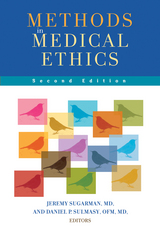
Medical ethics draws upon methods from a wide array of disciplines, including anthropology, economics, epidemiology, health services research, history, law, medicine, nursing, philosophy, psychology, sociology, and theology.
In this first book to systematically examine, critique, and challenge some of these disciplines and their methods in light of their influence on medical ethics, leading scholars present particular methods that have played significant roles in the field. The methods addressed include philosophy, religion and theology, professional codes, law, casuistry, history, qualitative research, ethnography, quantitative surveys, experimental methods, and economics and decision science. Reviewing each, they provide descriptions of techniques, critiques, and notes on resources and training. Physician-assisted suicide and euthanasia are used as an illustration of the richness of multidisciplinary work applied to individual issues. Similarly, genetic testing is used as an example of how multiple descriptive methods may privilege certain findings.
Methods in Medical Ethics is a valuable resource for scholars, teachers, editors, and students in any of the disciplines that have contributed to the field. As a textbook and reference for graduate students and scholars in medical ethics, it offers a rich understanding of the complexities of both moral questions and their answers.

Medical ethics draws upon methods from a wide array of disciplines, including anthropology, economics, epidemiology, health services research, history, law, medicine, nursing, philosophy, psychology, sociology, and theology.
In this influential book, outstanding scholars in medical ethics bring these many methods together in one place to be systematically described, critiqued, and challenged. Newly revised and updated chapters in this second edition include philosophy, religion and theology, virtue and professionalism, casuistry and clinical ethics, law, history, qualitative research, ethnography, quantitative surveys, experimental methods, and economics and decision science. This second edition also includes new chapters on literature and sociology, as well as a second chapter on philosophy which expands the range of philosophical methods discussed to include gender ethics, communitarianism, and discourse ethics. In each of these chapters, contributors provide descriptions of the methods, critiques, and notes on resources and training.
Methods in Medical Ethics is a valuable resource for scholars, teachers, editors, and students in any of the disciplines that have contributed to the field. As a textbook and reference for graduate students and scholars in medical ethics, it offers a rich understanding of the complexities involved in the rigorous investigation of moral questions in medical practice and research.

The government, the media, HMOs, and individual Americans have all embraced programs to promote disease prevention. Yet obesity is up, exercise is down, teenagers continue to smoke, and sexually transmitted disease is rampant. Why? These intriguing essays examine the ethical and social problems that create subtle obstacles to changing Americans' unhealthy behavior.
The contributors raise profound questions about the role of the state or employers in trying to change health-related behavior, about the actual health and economic benefits of even trying, and about the freedom and responsibility of those of us who, as citizens, will be the target of such efforts. They ask, for instance, whether we are all equally free to live healthy lives or whether social and economic conditions make a difference. Do disease prevention programs actually save money, as is commonly argued? What is the moral legitimacy of using economic and other incentives to change people's behavior, especially when (as with HMOs) the goal is to control costs?
One key issue explored throughout the book is the fundamental ambivalence of traditionally libertarian Americans about health promotion programs: we like the idea of good health, but we do not want government or others posing threats to our personal lifestyle choices. The contributors argue that such programs will continue to prove less than wholly successful without a fuller examination of their place in our national values.
READERS
Browse our collection.
PUBLISHERS
See BiblioVault's publisher services.
STUDENT SERVICES
Files for college accessibility offices.
UChicago Accessibility Resources
home | accessibility | search | about | contact us
BiblioVault ® 2001 - 2024
The University of Chicago Press









